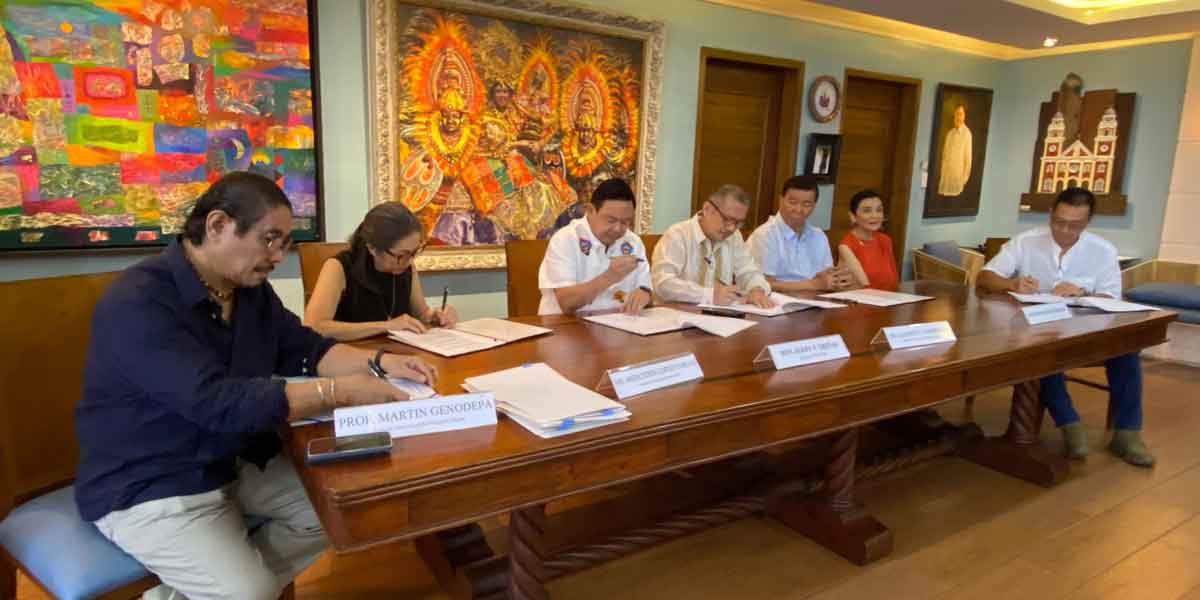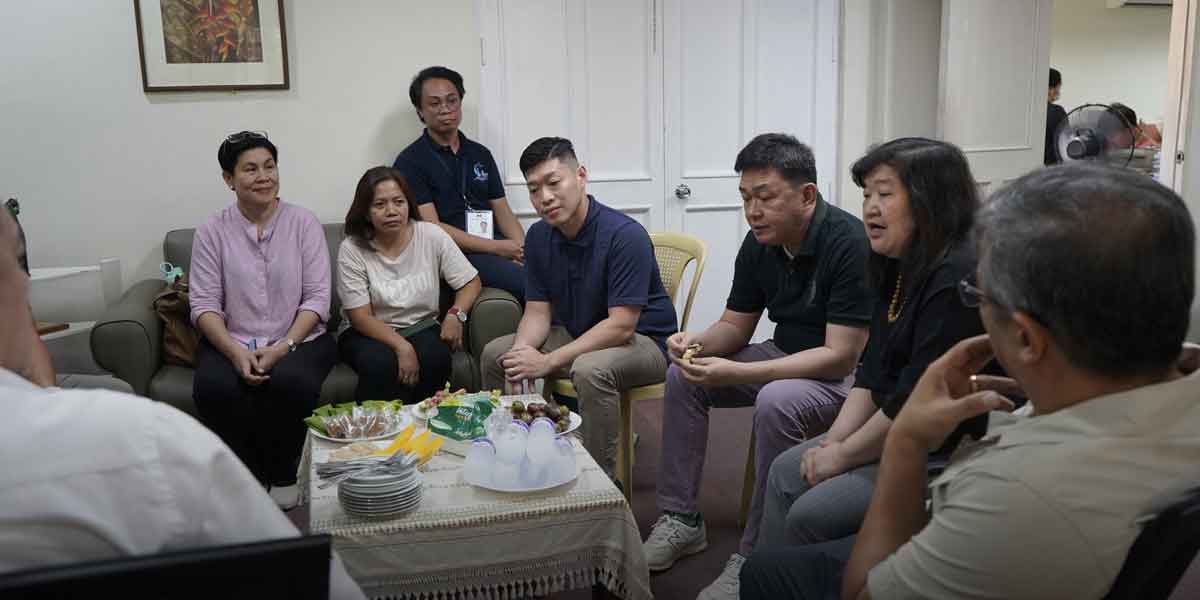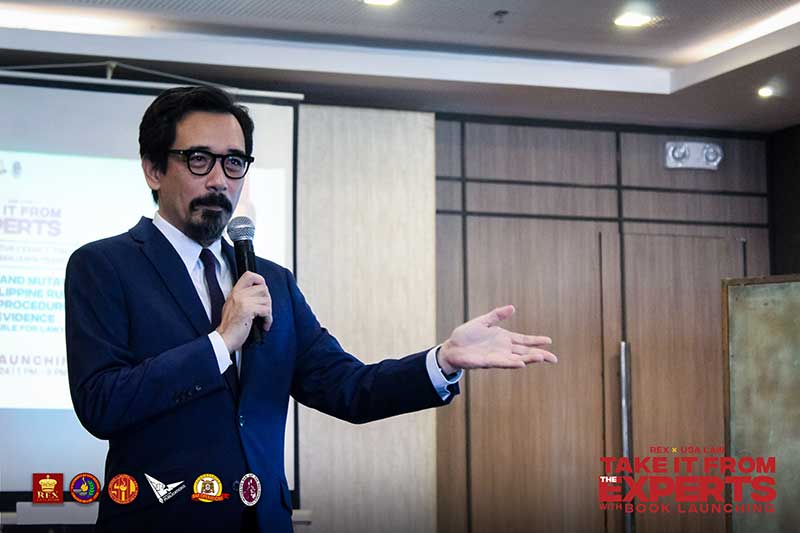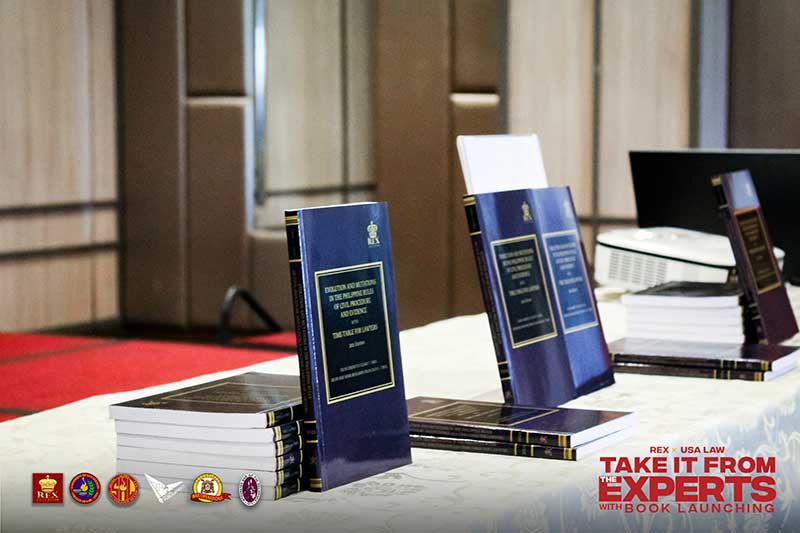By Joseph Bernard A. Marzan
Renowned experts from the University of San Agustin – College of Law (USA Law) launched a series of books this week to help current and future lawyers get a better grasp of current legal standards and follow changing trends in the profession.
USA Law Dean Jose Mari Benjamin Francisco Tirol and his father, the late Dean Emeritus Cesar Tirol, re-introduced their 2021 book ‘Evolution and Mutations in the Philippine Rules of Civil Procedure and Evidence with Timetable for Lawyers’ to the public on Wednesday, Feb. 28.
The book contains the 2019 amendments to the provisions of the Rules on Court on Civil Procedure and Evidence, with emphasis on the new provisions and amendments to old ones, and a summary of the time for effectivity of laws, the time to file pleadings, and all necessary periods necessary to the study and practice of law.
In a previous video recording, the late Dean Emeritus outlined the contents of the book and the evolution of certain provisions in the Rules of Court.
“At any rate, the lawyer is raring to show his forensic method to his client para justificar sus honorarios, as they say in Spanish, or ‘to justify his fees’, still has the cross-examination stage to prepare for and show his brilliance. The rules on cross-examination are there in Rule 132, Sections 6 to 14,” the elder Tirol explained.
The younger Tirol stated during the launch that the book reflects his father’s extensive experience in the profession, having witnessed the evolutions of procedural laws since the time it had been based on American rules.
“The excerpts that [my father] talked about in his message are the fruit of his 60-plus years practicing law, so you can just imagine the various rules of procedure that he had encountered in all those years,” the present Dean stated.
“The title of the book was chosen by my father, and his purpose was not just to come up with a basic textbook, but something different. His goal was to make the book as thin as possible[.] Our goal was not to discuss each and every rule, but the salient parts, especially those that had changed, why they have changed, what was the rule before, what is it now, and what we do to keep abreast of these changes,” he added.
He also confessed that it was his first time seeing and hearing his father after the latter died last year.
“During the pandemic, he decided that [because he] can’t go to the office, he wanted to do something and said he had the 2019 rules [on Civil Procedure and on Evidence], and he was very interested in the topic because it was something that he taught when he was an active law professor,” the Dean narrated.
“I asked him, and I was very honest, ‘What can I contribute?’, and he said, you can do the timetable. I scoured, and I served as his editor. It was a very interesting experience to proofread his work,” he also shared.
On Thursday, Feb. 29, Civil Law professor, Mandatory Continuing Legal Education lecturer, and Daily Guardian columnist Eduardo Reyes also introduced his book ‘Law on Property and Essentials of Land Registration’, which was released in the latter part of last year.
Reyes’ book, which is an ‘evolution’ of his teaching notes, offers an innovative approach by discussing legal concepts thematically rather than sequentially. He expressed his desire to provide a comprehensive resource that connects interrelated legal provisions.
He added that rather than focusing on the chronological order of provisions in the current laws, his approach dealt with grouping legal concepts together.
“My motivation is to teach students and share updates to lawyers and I wanted the resource materials to be embodied in one book. The unique features of the book include, among others, some literary content that is related to the subject, for an interesting read. The approach of the subject is also on a concept-per-concept basis as opposed to a provision-by-provision basis,” he told Daily Guardian.
“The book can help law students and lawyers traverse the maze of legal nuances as its discussion connects interrelated legal provisions for a more cohesive and comprehensive understanding of the concepts on property and land laws,” he added.
USA Law’s resident Alternative Dispute Resolution (ADR) expert Joenar Pueblo, who has had extensive experience in the field since the start of his career, launched his book ‘ADR Clausetrophobia: A Promdi Guide to Alternative Dispute Resolution,’ also on Feb. 29.
In the Introduction portion of the book, Pueblo expressed that the book was intended to bring the concept of ADR closer to law students and lawyers outside of Metro Manila, where most ADR cases in the country are being processed.
“If you are a law student studying in Manila or a new lawyer practicing in Makati, Quezon City, or BGC, this book is not for you. I assure you there are better books written by more established ADR practitioners on the matter,” Pueblo said in the book’s introduction.
“This book will attempt to encourage practitioners in the regions that there is a massive career opportunity in ADR in the provinces,” he added.
During the launch, Pueblo said that his book was meant to highlight ADR as “the future of legal practice”, citing it as a mode of legal dispute resolution without the need to litigate in court.
“Usually, if you are a more seasoned lawyer, there is a fear to adopt an ADR clause, because part of our rhythm [as lawyers] is to litigate. […] For a very long time, no practitioner, here or in Manila, would not use ADR because they don’t know what to do with it. That fear is what I’m trying to lessen insofar with this book,” Pueblo said.
“What we are trying to do here is to put the spotlight in the province that hey, we can do it also. We just need the avenue, we just need the people who can help us out. Since 1950, only now are we beginning to be aware of ADR, and it was found out that it is a very lucrative niche of practice, because it was usually used in commercial disputes,” he added.
All three books are available at Rex Bookstore Iloilo and online via the Rex e-Store and digital shopping platforms.






















